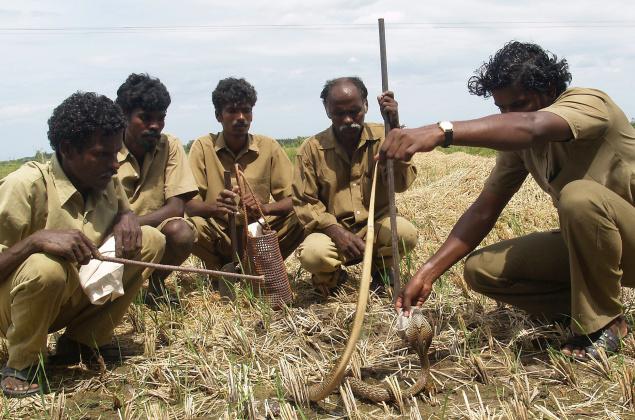
Photo credit: M. Karunakaran © The Hindu >>
Learn more about the Irula community & Snake >>
Armed with a crowbar, a sabre and a cotton bag, the group sets out at 5.30 a.m. from Vadanemmeli on East Coast Road. Taking the first bus to Mambakkam village on the Kelambakkam – Vandalur Road, the five-member team goes to a paddy field in the nearby Kolathur village.
This is the daily routine of Irula tribals involved in snake catching, who are employed by the Irula Snake Catchers Industrial Co-operative Society functioning from the Crocodile Bank on ECR.
G. Vadivel, who entered the profession when he was barely seven years old, says they catch only four species of poisonous snakes – cobra, krait, saw-scaled viper and Russel’s viper – found on paddy fields in Kancheepuram and Tiruvallur districts. […]
K. Ramesh, a third generation snake catcher, said the Irulas always move in groups of four or five to ensure that there are people around in the event of a snake bite. They consume a herb before setting out to catch snakes, details of which they are reluctant to part with.
Another snake catcher, C. Sankar, says from dawn till 11.30 a.m. they are on the fields. “We catch only poisonous snakes and when we come across non-poisonous ones we do not even touch them as they are farmer’s best friends. They help to keep the rodent population under control.” When he was bitten by a poisonous snake recently, the Society bore the entire medical expenses.
S. Dravida Mani, secretary of the Society, says it was started in 1982 mainly to help the tribal community earn a permanent income. It has 344 members with an annual turnover of Rs.1.5 crore. The members are allowed to catch 8,500 snakes a year. While the members get Rs. 2,000 for every cobra caught, they are paid Rs. 700 for krait, Rs. 2,000 for Russel’s viper and Rs. 250 for saw-scaled viper. Apart from this the members are paid bonus and incentive.
The Society is involved in extracting venom, which is in great demand for making anti-venom serum. A gram of cobra venom costs Rs. 25,000, that of krait Rs. 40,000, Russel’s viper Rs. 30,000 and saw-scaled viper Rs.45,000.
According to snake catchers, most of the youth in their tribe join them after dropping out of school.
Source: “Not a charmed life for snake catchers at work” by P. OPPILI, The Hindu, 6 September 2009
Address : https://www.thehindu.com/news/cities/Chennai/article16004.ece
Date Visited: Thu Mar 22 2012 18:24:34 GMT+0100 (CET)
“National development and the development of tribal communities are linked to each other.” – Droupadi Murmu
Speeches by the President of India >>
Up-to-date reports by Indian journalists and commentators
To search Indian periodicals, magazines, web portals and other sources safely, click here. To find an Indian PhD thesis on a particular tribal community, region and related issues, click here >>
Search tips
Combine the name of any particular state, language or region with that of any tribal (Adivasi) community.
Add keywords of special interest (music, poetry, dance just as health, sacred grove and biodiversity); learn about the rights of Scheduled Tribes such as the “Forest Rights Act” (FRA); and the United Nations “Declaration on the Rights of Indigenous Peoples”, “Universal Declaration of Human Rights”, “women’s rights”, or “children’s right to education”.
Ask a question that includes “tribal” or “Adivasi”, for instance: “Adivasi way of life better?” (or “tribal way of life worse?”)
Specify any particular issue or news item (biodiversity, bonded labour and human trafficking, climate change, ecology, economic development, ethnobotany, ethnomedicine, global warming, hunter-gatherers in a particular region or state, prevention of rural poverty, water access).
For official figures include “scheduled tribe ST” along with a union state or region: e.g. “Chhattisgarh ST community”, “Himalayan tribe”, “Scheduled tribe Tamil Nadu census”, “ST Kerala census”, “Particularly Vulnerable Tribal Group Jharkhand”, “PVTG Rajasthan”, “Adivasi ST Kerala”, “Adibasi ST West Bengal” etc.
In case the Google Custom Search window is not displayed here try the following: (1) toggle between “Reader” and regular viewing; (2) in your browser’s Security settings select “Enable JavaScript” | More tips >>
Note: hyperlinks and quotes are meant for fact-checking and information purposes only | Disclaimer >>
Learn more
Atree.org | Ashoka Trust for Research in Ecology & the Environment (posts)
Biodiversity | Hyderabad biodiversity pledge | Nilgiri Biosphere
Climate change | Audio | The Climate Question (BBC Podcast)
eJournals & eBooks | Background guide for education
eLearning: Center for World Indigenous Studies
Forest Rights Act (FRA) | Hunter-gatherers | Legal rights over forest land
Health and nutrition | Recommendations by the Expert Committee
“The tribal food basket has always been diverse and nutritious”
United Nations on climate change
What is the Forest Rights Act about?
Who is a forest dweller under this law, and who gets rights?